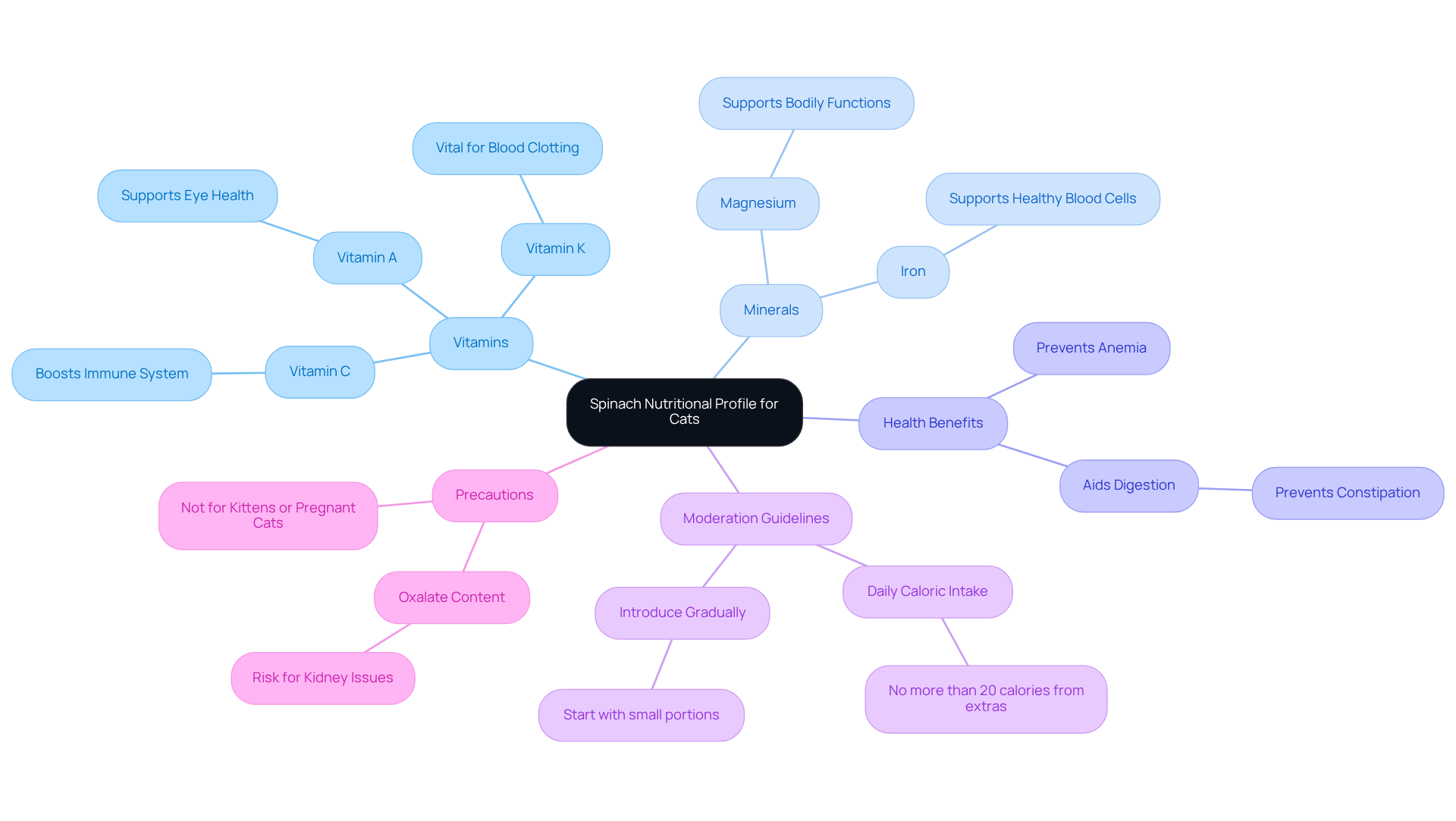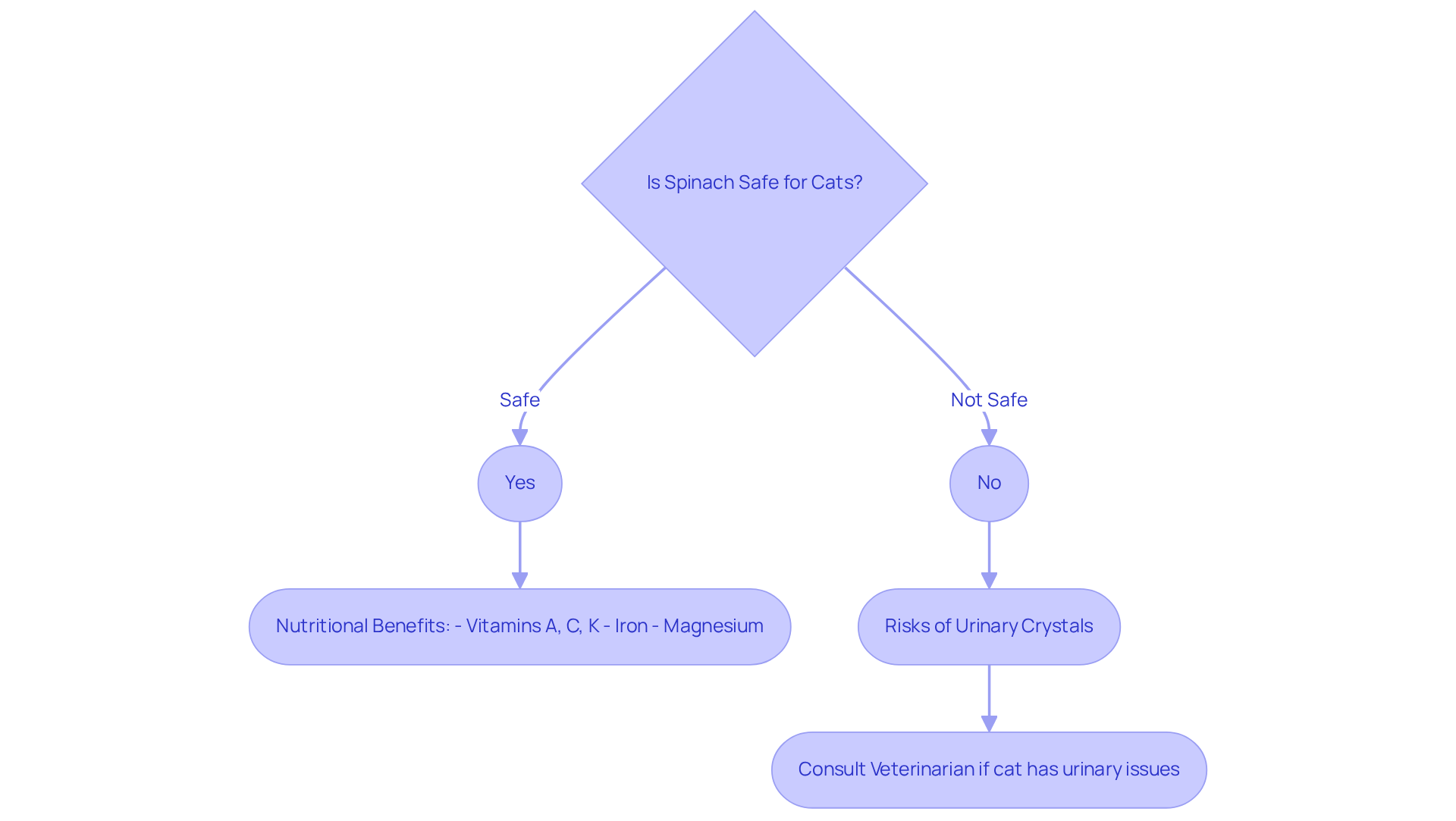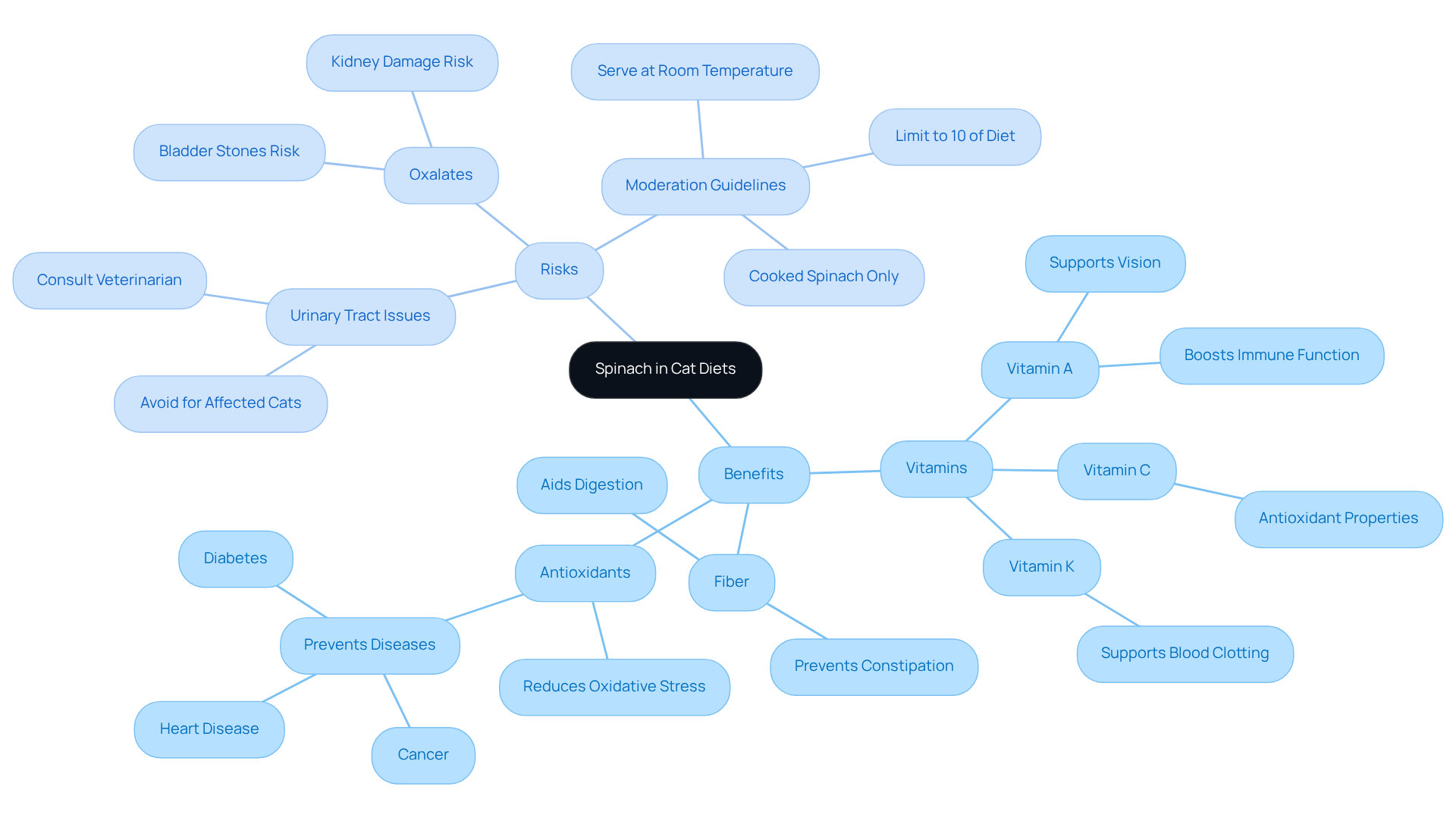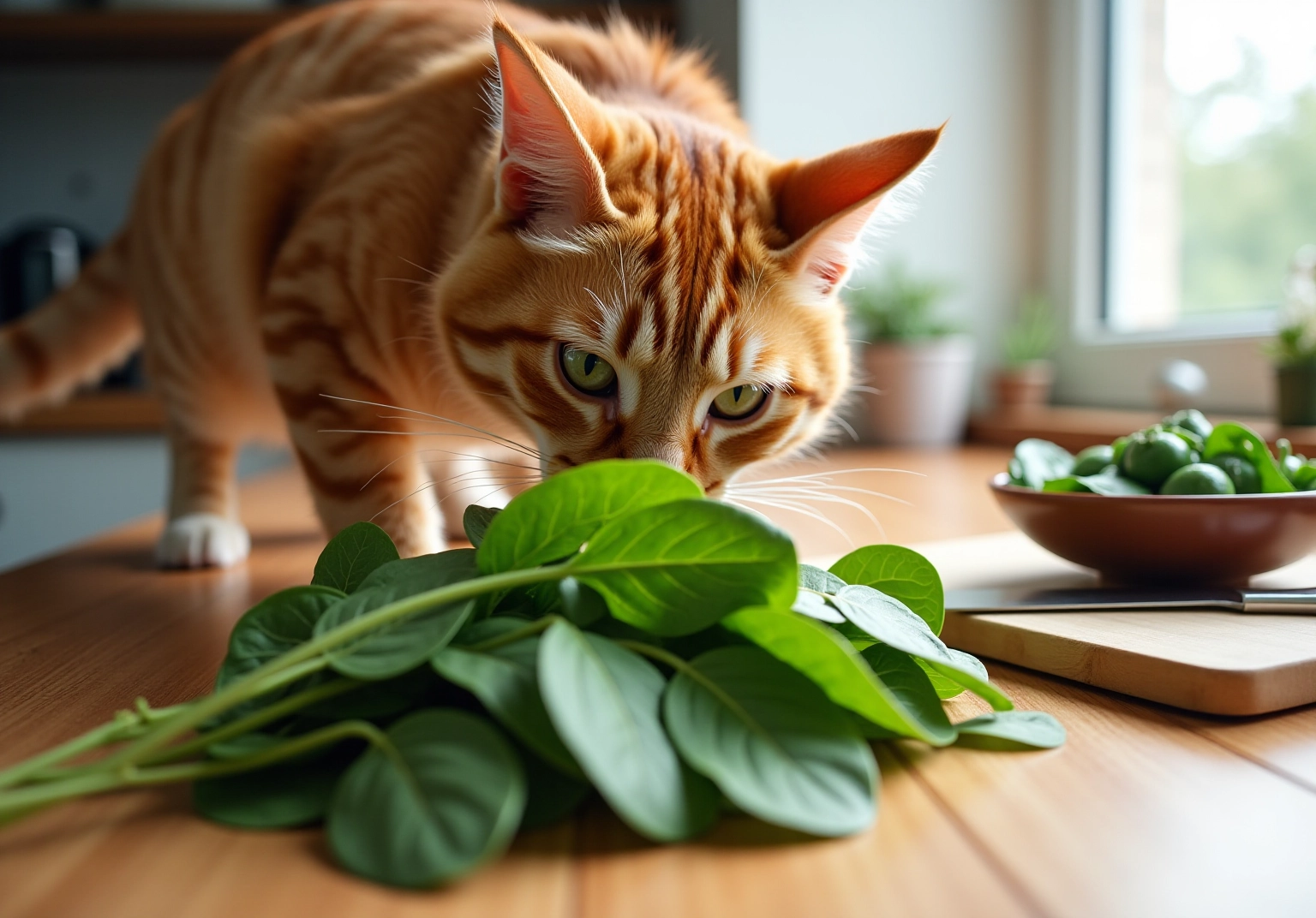Can Cats Eat Spinach? Understanding Its Nutritional Impact
Overview
As a loving pet owner, you may wonder about the best foods for your furry family members. Did you know that cats can enjoy spinach in moderation? This leafy green offers nutritional benefits such as:
- Vitamins A
- C
- K
along with essential minerals like:
- Iron
- Magnesium
However, it’s important to be aware of potential risks. Excessive consumption of spinach can lead to health issues due to oxalates, especially in cats with urinary or kidney problems. We encourage you to consult your veterinarian before introducing spinach into your cat’s diet, ensuring that you provide a nurturing environment for your beloved pet.
Introduction
Spinach, often celebrated for its vibrant green leaves and numerous nutritional benefits, brings forth an important question for caring cat owners: can our beloved feline companions eat spinach? This leafy green is not only rich in essential vitamins and minerals but also presents a wonderful opportunity to enhance your cat’s diet with additional nutrients.
However, it’s essential to recognize the potential risks associated with its consumption, especially for cats with specific health concerns. As devoted pet owners, how can we navigate this delicate balance between the benefits of spinach and the safety of our furry family members?
Define Spinach and Its Nutritional Profile for Cats
Spinach, a nutrient-dense leafy green, is cherished for its remarkable nutritional profile. It’s packed with essential vitamins, such as vitamin A, which supports eye health; vitamin C, known for boosting the immune system; and vitamin K, vital for proper blood clotting. Additionally, this leafy green provides essential minerals like iron and magnesium, which play crucial roles in many bodily functions.
While our beloved cats are obligate carnivores that primarily need protein, it is worth considering if can cats eat spinach, as incorporating small amounts of leafy greens into their diet can offer supplementary nutrients that positively impact their overall health. For instance, the iron found in leafy greens supports healthy blood cells, which is essential for preventing anemia. Moreover, the fiber in these greens aids digestion, helping to prevent constipation.
However, moderation is key; excessive consumption can lead to health issues, particularly in felines with urinary or kidney problems due to the presence of oxalates. Most cats require around 200 calories daily, suggesting that no more than 20 calories should come from additional foods like leafy greens. Therefore, when introducing leafy greens, it’s wise to start with small portions and monitor for any adverse reactions.
It’s also crucial to remember that the question of can cats eat spinach is important, as it should not be fed to kittens under six months or pregnant queens due to its oxalic acid content. As Jim Heising wisely states, ‘It is definitely not a substitute for meat and other forms of protein that your cat needs,’ reminding us of the importance of maintaining a balanced diet for our furry family members.

Assess Safety: Is Spinach Safe for Cats?
As a loving pet owner, you might wonder about the safety of introducing new foods to your furry family members. The question of whether can cats eat spinach arises, as spinach, a leafy green, is generally considered safe for cats to enjoy in moderation. This non-toxic vegetable can be a delightful addition to their diet, offering a wealth of vitamins A, C, and K, along with essential minerals like iron and magnesium that support your cat’s overall health.
However, it’s important to be aware that spinach contains calcium oxalate, which may lead to urinary crystals and stones in susceptible felines, prompting the question: can cats eat spinach? If your cat has a history of urinary tract issues or kidney disease, it’s best to avoid feeding them spinach altogether. Remember, while spinach can be a tasty treat, it should never replace your cat’s regular food.
Before introducing any new foods into your cat’s nutrition, especially if they have experienced urinary tract problems, always consult with your veterinarian to ensure their safety. Additionally, be sure to wash leafy greens thoroughly to remove any pesticides and steam them lightly to aid in digestion. By taking these precautions, you can provide a nurturing environment for your beloved pet while keeping their health in mind.

Evaluate Benefits and Risks of Spinach in Cat Diets
When considering dietary options, one might wonder can cats eat spinach, as incorporating it into your furry family member’s diet can yield several advantages. This leafy green is rich in fiber, which aids digestion, and is packed with essential vitamins that bolster overall health. Spinach is also abundant in antioxidants, which may help reduce oxidative stress and enhance a strong immune system. However, as a caring pet owner, it’s important to be aware of the associated risks, especially regarding whether can cats eat spinach, particularly for those with urinary tract issues. Considering that spinach contains oxalates, which can pose significant health risks if consumed in excessive amounts or by cats with pre-existing conditions, the question arises: can cats eat spinach?
To ensure the well-being of your beloved feline, you might wonder, can cats eat spinach in moderation? Think of it as an occasional treat rather than a dietary staple. Veterinary advice suggests that cooked leafy greens, including spinach, can cats eat spinach safely incorporated into a cat’s nutrition, but it should never surpass 10% of their overall caloric consumption to avoid possible health issues. It’s important to remember that, as obligate carnivores, while cats need most of their nutrition from meat protein, the inquiry of can cats eat spinach is valid since leafy greens should only make up a small part of their overall food intake.
It’s suggested to provide vegetables like leafy greens one to two times weekly, either mixed into their usual diet or as a special treat. Additionally, avoid uncooked leafy greens due to their oxalate levels. Always consult with your veterinarian before adding such greens or any unconventional foods to your cat’s nutrition. Your furry friend deserves the best care possible, and a nurturing environment is key to their happiness and health.

Guide to Introducing Spinach into Your Cat’s Diet
When considering adding greens to your furry family member’s diet, such as asking can cats eat spinach, it’s important to start with small portions to gauge their response. Spinach, for instance, is packed with vitamins A, C, and K, along with iron and calcium, leading to the question of whether can cats eat spinach for its valuable nutritional benefits. Gently preparing the greens can help lower oxalate levels, making them easier to digest.
Remember, it’s crucial to avoid any seasonings or oils, as these can be harmful to cats. Always wash the greens thoroughly to remove any pesticides before serving. Begin by offering a small piece of cooked spinach and observe your cat’s reaction to determine if can cats eat spinach. If they enjoy it without any signs of digestive upset, you can occasionally include spinach as a treat, but limit it to one serving per day or less; this leads to the question, can cats eat spinach?.
Stay vigilant for any adverse reactions, especially in cats with urinary or kidney concerns due to the presence of oxalates. If you have any worries about your cat’s diet, consulting with a veterinarian is always a wise choice. Your pet’s health and happiness are paramount, and taking these thoughtful steps can help create a nurturing environment for them.

Conclusion
Incorporating spinach into your furry family member’s diet can provide various nutritional benefits, but it must be approached with care. While spinach is rich in essential vitamins and minerals, it should only be offered in moderation to ensure the health and well-being of your beloved feline companion. Understanding the balance between the benefits and potential risks is crucial for pet owners seeking to enhance their cat’s diet.
This article highlights the nutritional profile of spinach, emphasizing its vitamins A, C, and K, as well as minerals like iron and magnesium. It also discusses the importance of moderation due to the presence of oxalates, which can pose health risks for certain cats, particularly those with urinary or kidney issues. Remember, consulting with a veterinarian before introducing spinach is a vital takeaway, ensuring that any dietary changes are safe and appropriate.
Ultimately, the decision to include spinach in your cat’s diet should be made thoughtfully, considering the individual health needs of your pet. By treating this leafy green as an occasional delight rather than a staple, you can enrich your cat’s diet while safeguarding their health. Embracing a balanced approach to nutrition will lead to happier and healthier feline family members. Your commitment to their well-being is what truly makes a difference.
Frequently Asked Questions
What is spinach and what nutrients does it provide for cats?
Spinach is a nutrient-dense leafy green that is rich in essential vitamins such as vitamin A, vitamin C, and vitamin K, as well as minerals like iron and magnesium, which are important for various bodily functions.
Can cats eat spinach?
Yes, cats can eat spinach in small amounts, as it can provide supplementary nutrients that benefit their overall health. However, it should not replace their primary need for protein.
What are the health benefits of spinach for cats?
The iron in spinach supports healthy blood cells and helps prevent anemia, while the fiber aids digestion and can help prevent constipation.
Is there a risk associated with feeding spinach to cats?
Yes, excessive consumption of spinach can lead to health issues, particularly in cats with urinary or kidney problems due to its oxalate content.
How much spinach can be safely included in a cat’s diet?
Since most cats require around 200 calories daily, no more than 20 calories should come from additional foods like leafy greens. It is advisable to start with small portions and monitor for any adverse reactions.
Are there any specific groups of cats that should avoid spinach?
Yes, spinach should not be fed to kittens under six months old or pregnant queens due to its oxalic acid content.
Should spinach be a substitute for meat in a cat’s diet?
No, spinach should not be considered a substitute for meat or other forms of protein, as cats are obligate carnivores and require a balanced diet that primarily consists of protein.







